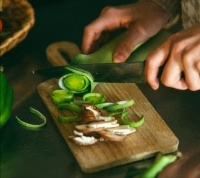Some ingredients leave a strong odor that lingers in the mouth for a long time after eating, and leeks are one of them. They’re a turn-off before a date, work, or meeting. But if you ignore the potential interpersonal complications, would you eat them regardless?
Why do leeks have such a strong smell?
The odor of leeks is strong and pungent. Some find it fragrant, while others avoid it. The flavor of leeks comes from the sulfide component propylene sulfide. While the smell puts some people off, sulfide is actually beneficial for cardiovascular health and antibacterial and anti-inflammatory properties.
Leeks are available year-round, but are particularly delicious in spring. They contain nutrients such as protein, vitamins B and C, zinc, and dietary fiber. Because of their pungent flavor, leeks are listed as one of the five pungent vegetables in vegetarian diets, along with onions and garlic. From a dietary perspective, leeks are known to benefit the cardiovascular system and promote blood circulation, and are also believed to warm the liver and kidneys.
Cooking chives with heat makes their aroma more pronounced. If you prefer this “chive flavor,” finely chop the chives or chive flowers and stir-fry them in oil for a more fragrant aroma. Chives pair best with ground meat, seafood, and other meats, while chive flowers can be combined with fermented black beans, soy sauce, and ground meat to create a versatile side dish.
The combination of chives and eggs softens the flavor with the eggy aroma. Cut the chives into sections and stir-fry them with the eggs. Adding shrimp, black fungus, and other ingredients adds richness and aroma. The odor of finely chopped chives is also slightly less pronounced than when finely chopped.
How can you reduce the smell of chives?
If you’re concerned about the strong flavor of chives, briefly blanching them in hot water before cooking can reduce the odor. Those who want to enjoy chives but are a bit wary of their smell can refer to Korean chive cooking methods, using chili powder or kimchi as a seasoning to soften the flavor. Chives are commonly used in Korean cuisine, such as the classic chive pancake, which is made by mixing chives into a batter and pan-frying them. Because the batter coats the pancake, it’s paired with a Korean dipping sauce, minimizing the visual and flavor impact of eating chives raw.
Add onions, squid, shrimp, shredded carrots, sliced meat, and chopped kimchi to the batter and pan-fry to create a luxurious kimchi chive pancake. I highly recommend trying this dish for those who haven’t tried it yet.
Another Korean dish is chive salad, which combines chives with onions, fish sauce, Korean chili powder, sugar, and sesame oil. Chili powder is also used, but whether you enjoy the chive flavor depends on the taste. While there are ways to reduce the chive flavor, it’s best to avoid it when it’s important.


Leave a Reply